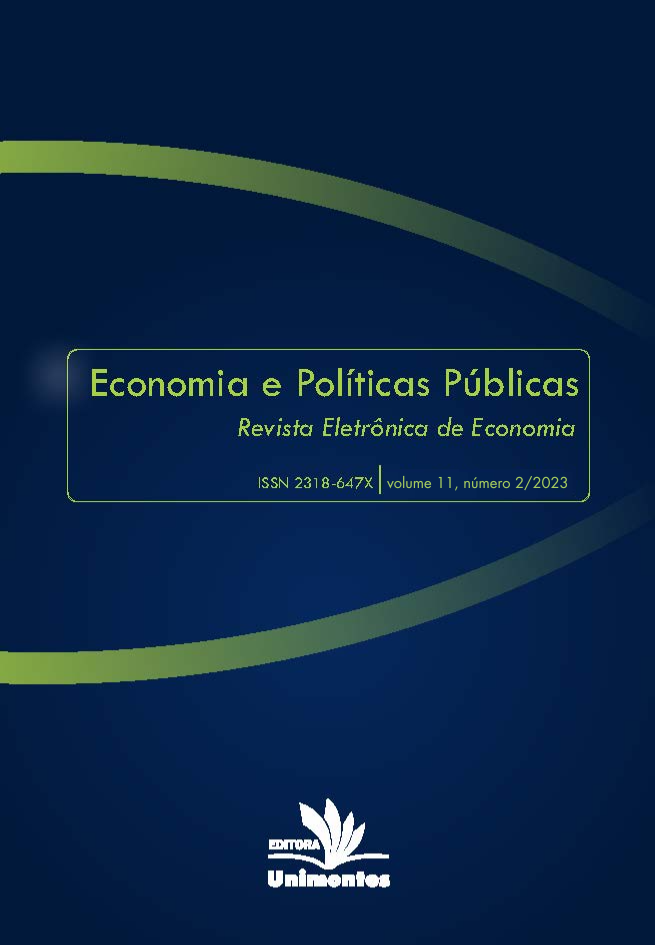The decelerating pace of China’s rate of economic growth:
a new-developmentalist approach
DOI:
10.46551/epp2023v11n0206Abstract
Resumo: O objetivo deste artigo é analisar as causas da desaceleração do crescimento econômico da China desde 2008. Duas hipóteses principais são apresentadas na literatura. A primeira é que a China teria caído em uma armadilha de renda média devido a uma suposta incapacidade de fazer a transição de uma economia liderada por investimentos para um crescimento baseado em inovação. Acreditamos que essa hipótese não é convincente, uma vez que muitas empresas de manufatura chinesas têm sido extremamente bem sucedidas em alcançar empresas de manufatura do mundo ocidental nos últimos 15 anos. Uma segunda hipótese é que a China, devido a uma taxa de poupança extremamente alta sustentada por mais de 40 anos, está agora enfrentando uma estagnação secular, ou seja, um esgotamento de oportunidades de investimento lucrativas. Isso significa que uma alta taxa de acumulação de capital, como a sustentada pela China até agora, está resultando em uma produtividade decrescente do investimento, o que pode ser comprovado pelo comportamento da relação produto-capital desde 2008. Nossa conclusão é que o ritmo decrescente de crescimento econômico da China se deve à estagnação secular combinada com uma supervalorização da taxa de câmbio que prejudica a expansão das exportações manufatureiras.
Palavras- chave: crescimento econômico, China, abordagem novo-desenvolvimentista.
Abstract: The aim of this article is to analyse the causes of growth deceleration of the Chinese economy since 2008. Two main hypothesis are advanced in the literature. The first one is that China had fallen in a middle-income trap due to a supposed incapacity to make a transition for a investment-led economy to an innovation based growth. We think that this hypothesis is not convincing, since many Chinese manufacturing companies are extremely successful to catch-up western-world manufacturing firms in the last 15 years. A second hypothesis is that China, due to an extremely high saving rate sustained for more than 40 years, is now facing a secular stagnation, that is, an exhausting of profitable investment opportunities. This means that a high rate of capital accumulation as the one sustained by China up to now is resulting in declining productivity of investment, what can be proved by the behaviour of output-capital ratio since 2008. Our conclusion is that China decelerating pace of economic growth is due to secular stagnation combined with an exchange rate over-valuation that harms the expansion of manufacturing exports.
Key-words: economic growth, China, new-developmentalist approach.
Downloads
References
Aghion, P; Antonin, C; Bunel, S. (2021). The Power of Creative Destruction. Harvard University Press: Cambridge.
Bresser-Pereira, L.C; Oreiro, J.L; Marconi, N. (2015). Developmental Macroeconomics: new developmentalism as a growth strategy. Routledge: London.
Harrod, R. (1939). “An essay in Dynamic Theory”. Economic Journal, 49 (14-33).
Oreiro, José Luis, Julio Fernando Costa Santos. 2023. “The Impossible Quartet in a Demand Led Growth super multiplier Model for a Small Open Economy”. Brazilian Journal of Political Economy 43 (3):592-618. https://doi.org/10.1590/0101-31572023-3448.
Rostow, W.W. (1960). The Stages of Economic Development. Cambridge University Press: Cambridge.
Downloads
Published
How to Cite
Issue
Section
License
Copyright (c) 2023 Journal of Economics and Public Policies

This work is licensed under a Creative Commons Attribution-NonCommercial-NoDerivatives 4.0 International License.
Os trabalhos publicados não serão remunerados em hipótese alguma.
O (s) autor (es), ao submeterem o trabalho à análise, automaticamente cedem os direitos de publicação à Revista, em sua versão eletrônica. e/ou impressa (A revista também será impressa e depositada em algumas bibliotecas de referência) licenciado sob a Licença Creative Commons Attribution (CC BY-NC-ND 4.0).
Os autores dos trabalhos aprovados NÃO terão direito a qualquer exemplar da edição em que constar sua publicação, pois trata-se de versão eletrônica.
Serão aceitos trabalhos com, no máximo, três autores.
Todos os casos não previstos serão analisados e decididos pelo Conselho Editorial que, dentre outras atribuições, ficará encarregada de informar aos autores da possibilidade da publicação, contra os quais não caberá recurso.




















